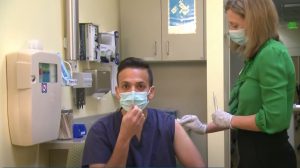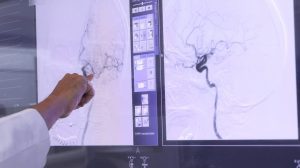NEW YORK (Reuters Health) – In patients with peptic ulcers, eradication of Helicobacter pylori seemed to double the risk of new-onset reflux – but only in cohort study subgroups, and not in randomized trials, according to a new meta-analysis.
In the January 19 advance online issue of the American Journal of Gastroenterology, the Canadian authors of the report observe that over the past few decades, hospitalization rates for duodenal and gastric ulcer and gastric carcinoma have fallen, whereas rates have risen for gastroesophageal reflux disease (GERD), Barrett’s esophagus, and esophageal adenocarcinoma. This pattern has led some to conjecture that H. pylori eradication may be responsible for both trends.
The research team, led by Dr. Richard H. Hunt from McMaster University in Hamilton, Ontario, conducted a comprehensive search of literature published from 1983 through 2007. Their meta-analyses included 7 randomized controlled trials (RCTs) and 5 cohort studies involving more than 4000 patients.
All had H. pylori infection and no evidence of GERD at the time of treatment. At 1 to 3 months after treatment, patients were tested for H. pylori resolution, and all were followed for 6 to 24 months for development of GERD. GERD was defined as heartburn more than once a week or endoscopic erosion in the distal esophagus.
Overall, there was no association of H. pylori eradication with GERD. In the 11 studies that confirmed erosive GERD with endoscopy (6 RCTs, 5 cohort studies, n = 4058), the OR was 1.17 (p = 0.17).
With pooled data from just the 6 RCTs, rates of erosive GERD were 6.9% after eradication and 4.9% with ongoing infection (OR, 1.11, p = 0.52).
Furthermore, in 5 RCTs (n = 760) that reported on development of symptomatic GERD, the rates were 39.6% in patients with H. pylori eradication and 36.9% in those with persistent infection (OR, 1.22, p = 0.22).
The 5 cohort studies included 1895 subjects. Rates of post-eradication GERD were 7.3% and 6.1% in the cured group and persistent-infection group, respectively (OR 1.37, p = 0.15).
The only signal that H. pylori eradication might increase the risk of new-onset GERD was in the subset of patients with peptic ulcer disease in four of the cohort studies. In this population, H. pylori eradication was associated with double the risk of erosive GERD (OR 2.04, p = 0.03).
Otherwise, there was no significant link between cure rates and GERD. Also, the researchers said, results did not differ when they compared “high quality” with “low quality” trials, or those with longer versus shorter follow-up periods.
They note that treatment regimens varied across trials. However, in RCTs, the control groups only received proton pump inhibitors.
“This could rule out the possibility of medication used for H. pylori eradication as a possible confounding factor for the development of GERD,” Dr. Hunt’s group suggests.
The investigators do not advise waiving anti-H. pylori therapy in patients with peptic ulcer disease for the sake of preventing GERD. Instead, patient instruction regarding GERD symptoms and long-term risk may be warranted.
Reference:
Am J Gastroenterol 2010.




